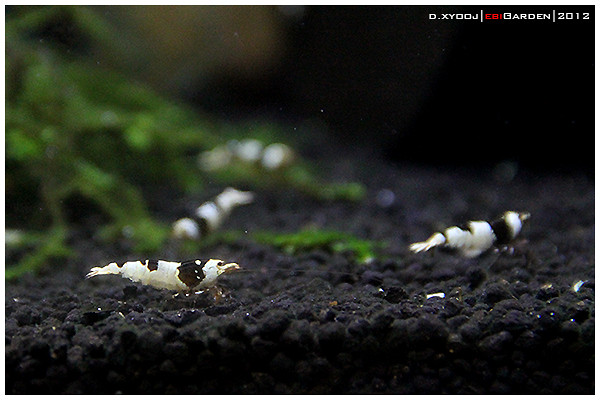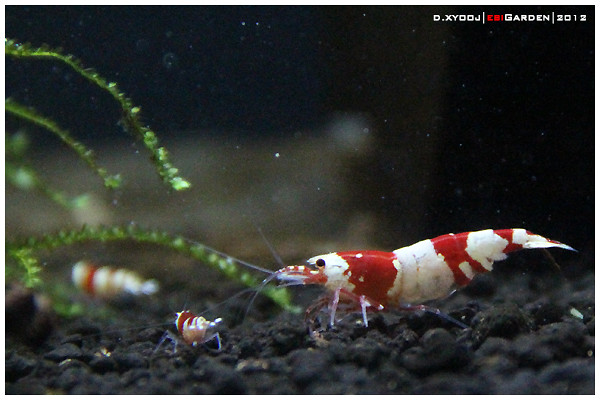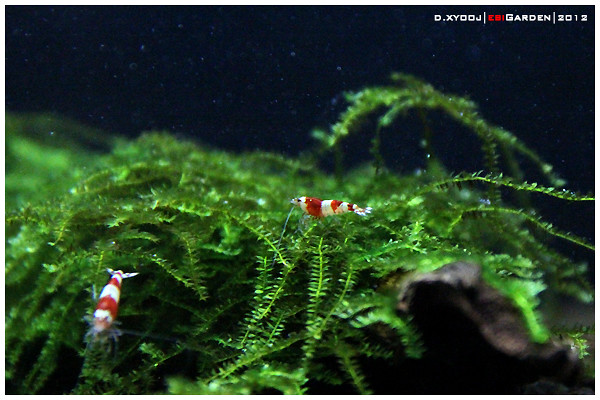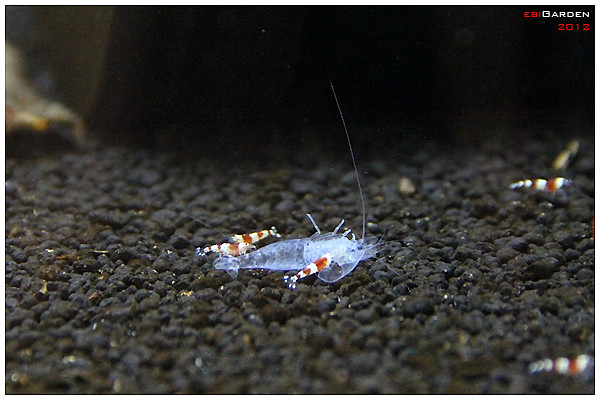 |
| Tylomelania sp. and Caridina dennerli Livestock and photo by Andy Bouwma, Lexinverts |
Monday, December 31, 2012
A Visit From Lexinverts
Labels:
Andy Bouwma,
breeders,
lexinverts,
minerals,
salty,
shrimp,
sulawesi
Saturday, October 6, 2012
Aquarium-Shops.com
Aquarium-Shops.com has officially launched, and serves as a one-stop source for hobbyists to find information on the aqua hobby, including forums, breeders, and shops. ebiGarden is featured on the site, plus many more excellent shrimp blogs, so check it out and submit your site!
Tuesday, October 2, 2012
Sumida Aquarium Update
Here is an update on the Sumida Aquarium aquascapes by Takashi Amano/ADA Japan. This video highlights the daily maintenance of the aquariums, including an exquisite trimming of the plants. Follow this link to see the impressive setup videos: Takashi Amano x Sumida Aquarium
Thursday, September 27, 2012
Summer was quite busy for me; I spent most of my time working on a health research project. I had time now and then to maintain my tanks, but I largely neglected them and just let the shrimp do their own thing: eat, forage, and breed. Near the end of May, I set up six 5.5 gallon tanks; they are now cycled but have no shrimp yet. I will work on selecting some out of my other tanks for breeding projects. I haven't kept up much with the shrimp hobby, both in the US and globally, but I think that TiBees are very popular now and less stigmatized than they were before. Looking forward to the new fad this Fall!
Friday, July 13, 2012
Shrimplet Survival: Tank Setup, Water Parameters, Biofilm, and Supplements
Keeping shrimplets alive has been a persistent challenge among some hobbyists, and is a problem observed across many forums of different languages. Many report having berried females and seeing released shrimplets; however, after a few days, the shrimplets simply vanish. This can be a frustrating experience since the goal of many shrimpkeepers is to be able to breed them, whether their aims are selective breeding or simply increasing their colonies.
My first experiences weren't so great, but after reading, reading some more, and communicating with other shrimpkeepers, I picked up some tips and gained some useful experiences. To date, I have successfully bred (at least F2+) CRS, CBS, TBs (BKK/WR), Super Tigers, OEBTs, Red Tigers, Cherries/Fire Reds, Red Rili, Blue Pearls, and Sulawesi Cardinals. The ones I've kept that I was unable to breed due to having a group of only one gender or inexperience include BTOEs, Orange Neos, Sulawesi Blueberry, and Sulawesi Harlequins.
I would like to share some personal tips on shrimplet survival (thus, breeding success). Keep in mind that these are practices that have worked best for me and that there are many other ways to approach keeping and breeding shrimp.
Tank Setup
- Sponge filters or steel-mesh/sponge-covered intakes on power/canister filters are a must so that shrimplets do not get sucked into the filter.
- Do not keep any fish with shrimp you are trying to breed. Any fish that can fit a shrimp/shrimplet in its mouth will probably try to eat it, even small rasboras and boraras are a threat to shrimplets. Oto cats may be okay, but I do not keep any fish with my shrimp.
- Use plants/moss and leaves/cholla wood/alder cones, etc. These provide places for shrimplets to hide and have a large surface area for biofilm/microfauna/beneficial bacteria to thrive in.
Water Parameters
- Keep a close watch on your water parameters, ammonia, nitrite, nitrate, pH, KH, GH, TDS, and temperature, to ensure they are in suitable ranges. Shrimp have been observed to breed in certain ranges; however, shrimplets did not survive in the same ranges.
- Copper, chlorine, and CO2 also need to be monitored if you are adding them or come from some other source.
- Take necessary measures (water changes, etc.) to adjust your parameters if any are significantly off and affecting your shrimp; however, keep in mind that drastic changes may do more harm, and that stability is important. If they are thriving and breeding well in parameters not in "recommended" ranges, then let them be.
Biofilm
- Keep the back and sides of your tank full of algae and biofilm (if not a show tank). I only scrape the front and let the shrimp go to work on the other panes. I've actually observed them cleaning away good portions from the glass.
- Moss and leaves are also good places where biofilm and microfauna thrive for shrimplets to consume.
Supplements
- Shrimplets cannot compete with adults when feeding from pellets or other food you add. Therefore, supplement with powdered food that can be dispersed throughout the tank.
- In addition to powdered food, you may want to add an immunity booster, such as Mosura Tonic Pro or BorneoWild Shield. Infections can occur for various reasons and can easily wipe out one's colony; take precautions to prevent such disasters.
Hope these tips are helpful. Let me know if you have any questions, thoughts, or anything you'd like to add.
Happy shrimping!
My first experiences weren't so great, but after reading, reading some more, and communicating with other shrimpkeepers, I picked up some tips and gained some useful experiences. To date, I have successfully bred (at least F2+) CRS, CBS, TBs (BKK/WR), Super Tigers, OEBTs, Red Tigers, Cherries/Fire Reds, Red Rili, Blue Pearls, and Sulawesi Cardinals. The ones I've kept that I was unable to breed due to having a group of only one gender or inexperience include BTOEs, Orange Neos, Sulawesi Blueberry, and Sulawesi Harlequins.
I would like to share some personal tips on shrimplet survival (thus, breeding success). Keep in mind that these are practices that have worked best for me and that there are many other ways to approach keeping and breeding shrimp.
Tank Setup
- Sponge filters or steel-mesh/sponge-covered intakes on power/canister filters are a must so that shrimplets do not get sucked into the filter.
- Do not keep any fish with shrimp you are trying to breed. Any fish that can fit a shrimp/shrimplet in its mouth will probably try to eat it, even small rasboras and boraras are a threat to shrimplets. Oto cats may be okay, but I do not keep any fish with my shrimp.
- Use plants/moss and leaves/cholla wood/alder cones, etc. These provide places for shrimplets to hide and have a large surface area for biofilm/microfauna/beneficial bacteria to thrive in.
Water Parameters
- Keep a close watch on your water parameters, ammonia, nitrite, nitrate, pH, KH, GH, TDS, and temperature, to ensure they are in suitable ranges. Shrimp have been observed to breed in certain ranges; however, shrimplets did not survive in the same ranges.
- Copper, chlorine, and CO2 also need to be monitored if you are adding them or come from some other source.
- Take necessary measures (water changes, etc.) to adjust your parameters if any are significantly off and affecting your shrimp; however, keep in mind that drastic changes may do more harm, and that stability is important. If they are thriving and breeding well in parameters not in "recommended" ranges, then let them be.
Biofilm
- Keep the back and sides of your tank full of algae and biofilm (if not a show tank). I only scrape the front and let the shrimp go to work on the other panes. I've actually observed them cleaning away good portions from the glass.
- Moss and leaves are also good places where biofilm and microfauna thrive for shrimplets to consume.
Supplements
- Shrimplets cannot compete with adults when feeding from pellets or other food you add. Therefore, supplement with powdered food that can be dispersed throughout the tank.
- In addition to powdered food, you may want to add an immunity booster, such as Mosura Tonic Pro or BorneoWild Shield. Infections can occur for various reasons and can easily wipe out one's colony; take precautions to prevent such disasters.
Hope these tips are helpful. Let me know if you have any questions, thoughts, or anything you'd like to add.
Happy shrimping!
 |
| Shrimp breeding tank with sponge filter, biofilm on glass, moss, catappa leaves, and supplements. |
Tuesday, June 12, 2012
Takashi Amano X Sumida Aquarium
This 4-part video series documents Takashi Amano's (Aqua Design Amano) attempt at creating massive scale nature aquariums at Tokyo's Sumida Aquarium. The planning phase, planting, and finished layouts are very impressive. Though not shrimp related, I think these are great videos. Embedded in order below.
Wednesday, May 30, 2012
Friday, May 25, 2012
The Lure of Pure
The US shrimp hobby has seen a wave of "Pure Red Lines" (PRL) for sale recently, marketed to be from reputable breeders such as Benibachi, Crimson, and Ebi-ten. Such shrimp carry quite a hefty price, but cost hasn't deterred many shrimpkeepers; most of these shrimp are pre-ordered and the remaining are quickly purchased by eager buyers.
This isn't the first time Pure Red Lines were in the US though. Shrimp breeder Yoyo has been keeping Ebi-ten PRL CRS since June of 2011, and has successfully bred them, and continues to do so.
Wanting to see these shrimp for myself, I purchased a group of 10 last month. As I am already working on selectively breeding my own lines, I opted to go with the "lowest" grade, just to see what they are like. Phenotypically, they look just like my other CRS, whites and reds aren't any thicker or brighter. Perhaps this is what the low grades are like, culls from the high grade shrimp; though from seeing photos from keepers who purchased high grades, they do not seem comparable to shrimp featured on the sites of said line (again, culls?). We'll see what the subsequent generations are like.
However, I warn novice shrimpkeepers to not make a quick decision to purchase these PRL shrimp. The prices are quite high compared to other CRS in the market, and if you are inexperienced with keeping shrimp (particularly the "more difficult" Caridina types), the risk exists that the shrimp won't last very long. Though it is great to see PRLs available in the US (I am grateful that these breeders are allowing their shrimp to be sold here - thank you!), I suggest shrimpkeepers keep, breed, and maintain their own lines as well - breeding projects are great fun and doing so will propel US shrimpkeepers in the international shrimp hobby.
This isn't the first time Pure Red Lines were in the US though. Shrimp breeder Yoyo has been keeping Ebi-ten PRL CRS since June of 2011, and has successfully bred them, and continues to do so.
 |
| Benibachi PRL CRS |
However, I warn novice shrimpkeepers to not make a quick decision to purchase these PRL shrimp. The prices are quite high compared to other CRS in the market, and if you are inexperienced with keeping shrimp (particularly the "more difficult" Caridina types), the risk exists that the shrimp won't last very long. Though it is great to see PRLs available in the US (I am grateful that these breeders are allowing their shrimp to be sold here - thank you!), I suggest shrimpkeepers keep, breed, and maintain their own lines as well - breeding projects are great fun and doing so will propel US shrimpkeepers in the international shrimp hobby.
Monday, May 21, 2012
Wednesday, May 16, 2012
YU CRS CENTER
Here is a great informational video on YU CRS CENTER, a company based in Taiwan that employs a state-of-the-art operation, reaching shrimpkeepers around the world. YU CRS CENTER will be at Interzoo this week; if you find yourself in Nuremberg, Germany with nothing to do, stop by and check out their amazing shrimp (along with everything else there)!
Tuesday, May 1, 2012
The Latest Buzz: Freshwater Bee Shrimp (TFH Magazine)
The shrimp hobby is in full swing here in the States, and Tropical Fish Hobbyist (TFH) Magazine has taken notice. Several articles on shrimp have been published in TFH before; however, this one focuses primarily on the Bee Shrimp (Caridina cf. cantonensis), with a photo by Speedie!
Follow the link below to read the full article:
"The Latest Buzz: Freshwater Bee Shrimp"
Follow the link below to read the full article:
"The Latest Buzz: Freshwater Bee Shrimp"
Friday, April 27, 2012
Kris Weinhold - Guitarfish.org
 |
| Kris Weinhold (left) chats with fellow shrimpkeeper and planted tank hobbyist Jack Ho. |
I actually discovered Kris' blog when Sulawesi shrimp first hit the hobby and I was looking for information on them. Kris was one of the first in the US to acquire them; however, like many in the beginning, he faced some difficulty in maintaining his colonies.
We chatted briefly about the shrimp hobby, nano fish, and aspects of the planted aquariums. Kris urges planted tank hobbyists to enter competitions - such as the AGA an IAPLC - and noted that these are great opportunities to receive comments, advice, and suggestions on improving one's own aquascaping approach, as he experienced firsthand; IAPLC's entry period closes in 34 days, get your submissions in!
Labels:
aga,
guitarfish,
guitarfish.org,
iaplc,
kris,
maah,
weinhold
Friday, April 6, 2012
Super Tiger Shrimp Habitat
The Crustahunter team shows us the Super Tiger Shrimp's (Caridina cantonensis) natural habitat! From what I've gathered online, they are found in swampy areas and not in creeks such as where the Bee Shrimp can be found. Also mentioned in the video are other new shrimp, with one called the "Blue Fu Shrimp" (a bit more info provided by a comment on this post). Stay tuned for more exciting news regarding these new shrimp, plus other new species recently shown! Check out the video below:
Tuesday, April 3, 2012
Tuesday, March 27, 2012
Feeding Time!
A good friend and fellow shrimpkeeper gave me some new food to try: barley straw pellets and Ebita Breed Quatro 2. My shrimp love both of them and swarm over it immediately. One thing about the barley pellets though, is that it breaks up quickly and into lots of small pieces; using a feeding dish is a good idea if you are concerned about waste in your tank. Feeding time is usually when I take photos as the shrimp come out of all the nooks and crannies. I still haven't had the chance to get a macro lens yet, so pictures aren't as crisp and clean as I'd like, and as other shrimpkeepers' photos out there. :(
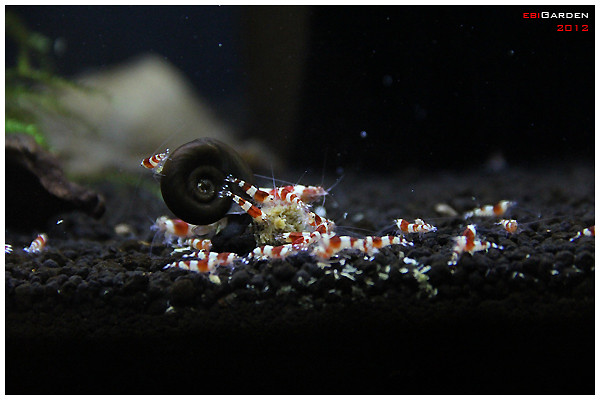
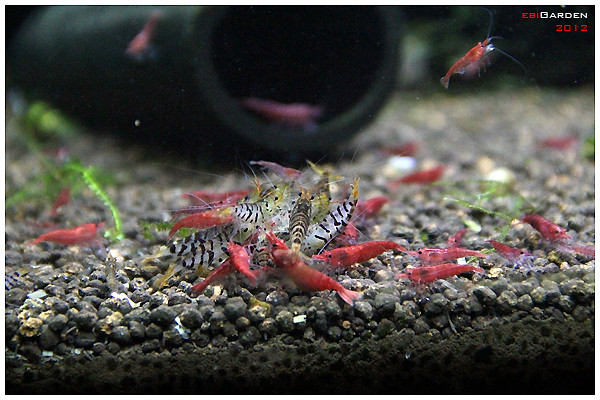
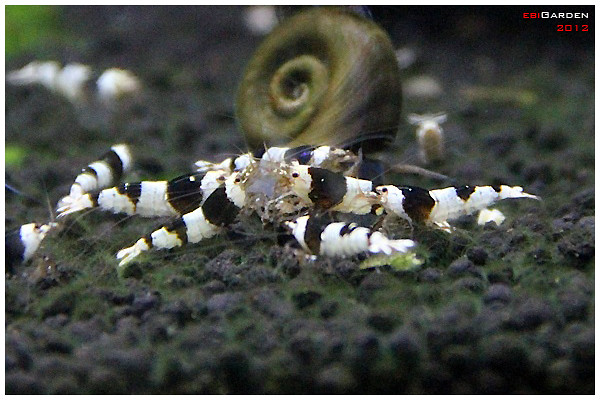



Tuesday, March 20, 2012
The water flow can't stop the shrimp from eating, watch them pile up!
(Video from masaki5125@YouTube).
(Video from masaki5125@YouTube).
Sunday, March 11, 2012
Check out this video of a beautiful nano tank, plants, and shrimp - very peaceful!
Monday, February 6, 2012
Last August, there was a 2-week period in which I transitioned from my old apartment to my new one. I had to move all my tanks to my parents' (2.5 hours away!) since the construction of my new building wasn't completed yet. When I moved back, I left a few tanks, along with a 20L CBS. This past weekend, I visited my parents; the CBS population has grown well and I may be reaching the "high-density tank" level - though I anticipate selling/donating some shrimp.
Among the CBS was a "Super" Crystal Red Shrimp, though this one may be a low grade Super CRS, or simply just a super low grade CRS. Common names aside, it is simply a CRS that has a wider red coverage and minimal white.
Here's a video of it making its way to the food:
And a video of the CBS feeding:
(sorry for the poor quality, videos were taken with my phone)
Among the CBS was a "Super" Crystal Red Shrimp, though this one may be a low grade Super CRS, or simply just a super low grade CRS. Common names aside, it is simply a CRS that has a wider red coverage and minimal white.
Here's a video of it making its way to the food:
And a video of the CBS feeding:
(sorry for the poor quality, videos were taken with my phone)
Friday, February 3, 2012
Basic Principles of the Hamburger Mattenfilter
Also check out the other "Knowledge Base" articles on shrimpkeeping - excellent information from all over the world!
(click on italicized phrases to follow the link)
Sunday, January 22, 2012
The Super Tiger x BTOE shrimplets are growing well, all at about 1/2" now. They appear similar to Super Tigers, where the stripes are evident, but not full coverage like BTOEs. Also, from the ones I've spotted, their eyes are dark, indicating that this trait is perhaps dominant; my earlier observations indicated light/orange eyes, which may have needed time to darken. It will be interesting to see what the F2 generation will look like.
Friday, January 6, 2012
Speedie Aquatics
 Nick (aka speedie408) has been explosive in the US shrimp scene in 2011, and I suspect he'll be a big player in the years to come. I first communicated with Nick on The Planted Tank forum in regards to...planted tanks! His willingness to offer advice on caring for plants, aquascaping, and even photography truly demonstrates his knowledge of this hobby, and his positive attitude towards helping others - it's no wonder so many individuals admire him!
Nick (aka speedie408) has been explosive in the US shrimp scene in 2011, and I suspect he'll be a big player in the years to come. I first communicated with Nick on The Planted Tank forum in regards to...planted tanks! His willingness to offer advice on caring for plants, aquascaping, and even photography truly demonstrates his knowledge of this hobby, and his positive attitude towards helping others - it's no wonder so many individuals admire him!I remember a time when he didn't care much for keeping shrimp, but that's all changed now. These little critters can really catch one's attention, and for the benefit of us all, I'm glad they got his. Combine his passion for photography and his amazing livestock, and you will get some of the most beautiful shrimp photos out there. Nick recently launched Speedie Aquatics, a website dedicated to his tanks, plants, fish, and shrimp; check it out, it's okay to drool a little :)
Sunday, January 1, 2012
Happy New Year!
To kick off the new year, I am offering a RAOK for 15 Crystal Black Shrimp + 5 Ramshorn Snails (cleanup crew)! Follow the link for how to win: RAOK - CBS
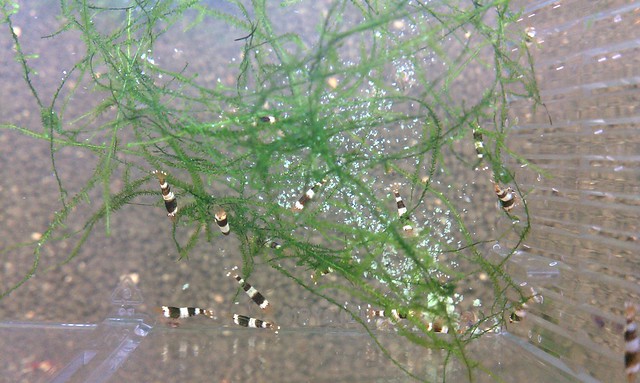

Subscribe to:
Comments (Atom)



